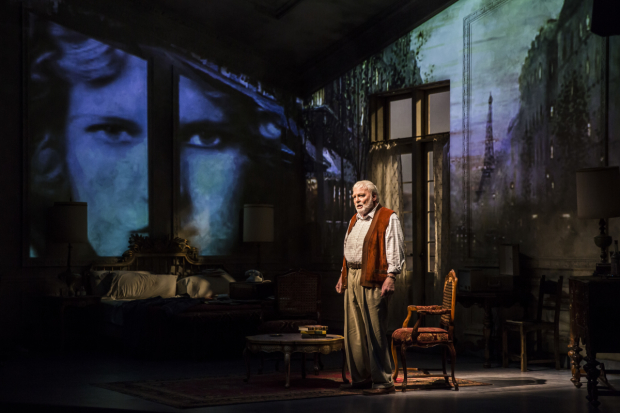A Literary Giant Wrestles With His Legacy in Pamplona

(© Liz Lauren)
In May of 2017, Stacy Keach attempted to open Jim McGrath's Pamplona at the Goodman Theatre. He took the stage in character as Ernest Hemingway, started strong — and faltered. The show was canceled. It was announced that Keach had suffered a mild heart attack onstage. One year later, Keach is back at the Goodman for a second shot at playing the famous author, and proving himself as staunch and indomitable as his subject matter.
The solo show takes place in 1959, five years after Hemingway won his Nobel Prize. Life magazine has commissioned an article on the Spanish bullfighting season. Hemingway is holed up in a Pamplonan hotel. His writing has hit a wall. He is beleaguered by paranoid delusions and fed up with his writer's block. And so, to procrastinate, he addresses the audience in a lengthy monologue, telling stories that meander organically through the decades of his life.
As devices for biographical solo shows go, it's not bad. There's a clear passion burning within Keach's performance, which elevates the threadbare tropes that plague the genre (McGrath's script includes a few too many expositional single-sided phone calls, for example). But you couldn't ask for a better Hemingway than Keach, who brings not just a credible impression, but the riveting pacing and panache of a consummate showman.
Though obviously fictionalized, we're meant to be hearing Hemingway's life in his own words, and as such, McGrath's play is very generous to Hemingway's legacy. The real-life Hemingway was a heavy drinker and a serial adulterer with a nasty temper. The Hemingway of McGrath's play is tricked into infidelity by perfidious women and provoked to anger by former friends, colleagues, and lovers who deserved the vitriol they got. When he drops his guard and reveals legitimate traumas — including being raised as a girl by his manic mother until he was five years old — the man shows no vulnerability, only more anger. It's true to the man, perhaps, but exhausting to watch, even with a neat 90-minute run time.
While his fire and fury gets repetitive, Hemingway's life certainly makes for engaging stories, particularly when he recounts his years living as an expatriate in Paris in the 1920s. Those years, also the basis for his novel The Sun Also Rises and his memoir A Moveable Feast, are the heart of Pamplona. As young and hungry Hemingway travels through Spain with his legendary companions, his lifelong passion for bullfighting is ignited. Those bullfights are brought to life by Adam Flemming's projections and Michael Roth's immersive soundscapes. Flemming's projections are nearly always present, filling Hemingway's hotel room walls, which come courtesy of Kevin Depinet's artfully askew forced-perspective set.
Director Robert Falls's restrained staging relies on Keach to hold the audience's attention for 90 minutes. His confidence pays off. Pamplona is imperfect, but it is memorable and evocative thanks to Keach's remarkable performance.










